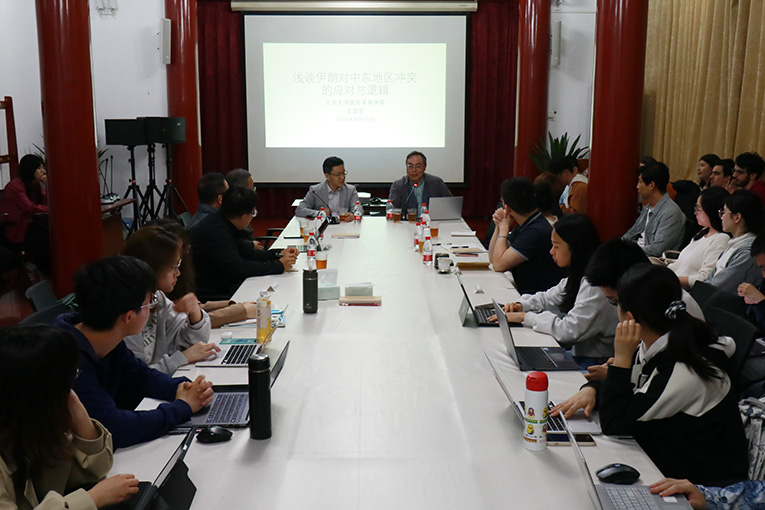On the evening of April 16, 2024, the Institute of International and Strategic Studies (IISS), Peking University (PKU) held the 73rd North Pavilion Seminar series lectures. Associate Professor Wang Suolao from the Institute of Asian and African Studies at the School of International Studies (SIS), Peking University (PKU) gave a lecture titled “A Discussion on Iran's Response and Logic in the Middle East Conflicts” and interacted with the audience. The lecture was hosted by Associate Professor Gui Yongtao, Associate Dean of SIS, PKU and Vice President of IISS, PKU.

According to Associate Professor Wang Suolao, the current Middle East conflicts are influenced by both international politics and the domestic politics of relevant countries. Although Iran claimed that its attack on Israel on April 14 could be considered concluded, there remains a potential risk of escalation.
Associate Professor Wang noted that Israel's airstrike on the Iranian embassy in Syria on April 1 reflected the longstanding tensions between Israel, Iran, and Syria. It also involved Israel's dissatisfaction with Iran's relations with organizations related to the recent Israel-Palestine conflict and the pressure on Israeli Prime Minister Netanyahu from domestic political situations and U.S.-Israel relations. Additionally, Israel's choice of targets and the precision of its strikes demonstrated the capabilities of its intelligence agencies. Conversely, Iran's unprecedented use of missiles and drones to attack Israeli territory after repeatedly announcing retaliatory strikes against Israel reflected Iran's accumulated military experience and capabilities in recent years, which could also be interpreted from the perspective of Iran's domestic politics.
Regarding the future direction of the Middle East situation, Associate Professor Wang suggested that the situation will become more complex due to the emerging differences between the U.S. government and Netanyahu's cabinet on Middle East issues. Factors such as the Iran nuclear issue, the 2024 U.S. presidential election, Netanyahu's personal political prospects, and Iran's domestic political environment are significant variables affecting the situation. The safety situation in the Middle East is crucial for international energy security and global trade logistics.
In the Q&A session, Associate Professor Wang discussed with the audience on issues such as Israel's domestic situation, the attitudes and roles of the U.S., China, Russia, and other countries and the international society in the existing situation, the variables in future U.S.-Israel relations, and Israel's current strategic options and their backgrounds.(Content contributor: Wang Runtan)
Editor: Li Fangqi Photographer: Zheng Peijie

